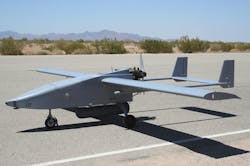Tony Sebasto, senior associate for Munitions at ARDEC, said this technology could offer the U.S. warfighter an option for an affordable and capable precision strike weapon.
Designed to meet the needs of the Army, Marine Corps and Special Forces for a rapid target response capability, the air drop mortar program uses existing mortar inventory to provide a low-cost, lightweight weapon system. The General Dynamics' RCFC guidance kit, with a flight-control and GPS-based guidance and navigational system, adds precision-strike capability to existing mortars. The nose-mounted guidance kit replaces existing mortar fuzes and has been demonstrated on several mortar calibers in both air-drop and tube-launch applications. The kit provides a common, multi-platform guidance, navigation and control (GNC) and integrated weapon system for unmanned aircraft.
